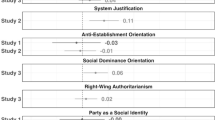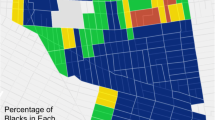Abstract
Since Barack Obama appeared on the political scene, questions regarding the authenticity of his blackness have remained at the forefront because of his mixed race parentage and nontraditional upbringing. These factors proved to be variously a political asset and liability as his blackness was often framed as scary to white voters who were essential to his electoral coalition. We argue that in order for whites to trust Obama politically, they divorced him from his black identity making him the “racial exception,” which made him more palatable. This, in part, was influenced by the deracialized electoral strategies deployed by Barack Obama. Still, we find race influences evaluations of Barack Obama differently by blacks and whites. Relying on data from the Pew Research Center, we find evidence that Barack Obama’s racial identity is more ambiguous for whites and evaluations of his favorability, values, and tenor of his opposition to fall along racial lines in significant ways despite the rhetoric of a post-racial America.
Similar content being viewed by others
References
Avila, O. (2010). Obama’s census-form choice: ‘Black’. Los Angeles Times.
Bacon, P. (2007). Rock solid support for Obama, but will the Black vote follow?, The Washington Post.
Bai, M. (2008). Is Obama the end of black politics?, New York Times Magazine.
Bimbaum, N. (2008). The presidential election of 2008. Public Opinion Quarterly, 79, 344–353.
Block, R. J. (2011). Backing Barack because he’s Black: racially motivated voting in the 2008 election. Social Science Quarterly, 92, 423–446.
Burch, T. (2009). Can the new commander in chief sustain his all-volunteer standing army? DuBois Review, 6, 153–171.
Coates, T-N. (2012). Fear of a Black president, The Atlantic.
Collett, C. (2008). Minority candidates, alternative media, and multiethnic America: deracialization or toggling? Perspectives on Politics, 6, 707–728.
Collins, P. H. (2000). Black feminist thought, knowledge, consciousness, and the politics of empowerment. New York: Routledge Press.
Conover, P. J., & Feldman, S. (1982). Projection and the perception of candidates’ issue positions. The Western Political Quarterly, 35, 228–244.
Crouch, S. (2006). What Obama isn’t: Black like me on race, New York Daily News.
Davis, J. (2001). Who is Black? One nation’s definition. University Park: Pennsylvania University Press.
Edge, T. (2010). Southern Strategy 2.0: conservatives, White voters, and the election of Barack Obama. Journal of Black Studies, 40, 426–444.
Feagans, B. (2008). Georgian recalls rooming with Michelle Obama, The Atlanta Journal Constitution.
Feldman, S., & Huddy, L. (2005). Racial resentment and White opposition to race-conscious programs: principles or prejudice? American Journal of Political Science., 49, 168–183.
Finkel, S. E., Guterbock, T. M., & Borg, M. J. (1991). Race-of-interviewer effects in a preelection poll: Virginia 1989. The Public Opinion Quarterly, 55, 313–330.
Fiske, S., Bergsieker, H. B., Russell, A. M., & Williams, L. (2009). Images of Black Americans: Then, 'Them', and Now, and Now, 'Obama!'. DuBois Review, 6, 83--101.
Ford, P. K., Johnson, T. A., & Maxwell, A. (2010). ‘Yes we can’ or ‘yes we did’? Prospective and retrospective change in the Obama Presidency. Journal of Black Studies, 40, 462–483.
Franklin, S. (2010). Situational Deracialization, Harold Ford, and the 2006 Senate Race in Tennessee. In G. Andra (Ed.), Whose Black Politics?: Cases in Post-Racial Black Leadership. New York: Routledge Press.
Garcia, J. A. (2014). The Obama factor and pan-minority coalitions? Politics, Groups, and Identities, 2, 491–499.
Gay, C. (2002). Spirals of trust? The effect of descriptive representation on the relationship between citizens and their government. American Journal of Political Science, 46, 717–732.
Hajnal, Z. (2007). Changing White attitudes toward Black political leadership. New York: Cambridge University Press.
Harris, F. C. (2012). The price of the ticket: Barack Obama and the rise and decline of Black politics. New York: Oxford University Press.
Highton, B. (2011). Prejudice rivals partisanship and ideology when explaining the 2008 presidential vote across the states. PS: Political Science and Politics, 44, 530–535.
Hollinger, D.A. (2008). Obama, Blackness, and Postethnic America. Chronicle of Higher Education, 54, B7--B10.
Hutchings, V. L. (2009). Change or more of the same? Evaluating racial attitudes in the Obama era. Public Opinion Quarterly, 73, 917–942.
Jeffries, J. L. (1998). Blacks and high profile statewide office: 1966-1996. The Western Journal of Black Studies, 22(3), 164–173.
Jeffries, J. L. (1999). US Senator Edward W. Brooke and Governor L. Douglas Wilder tell political scientists how Blacks can win high profile statewide office. PS: Political Science and Politics, 32, 583–587.
Kam, C. D., & Kinder, D. R. (2012). Ethnocentrism as a short-term force in the 2008 American presidential election. American Journal of Political Science, 56, 326–340.
Kinder, D. R., & Sanders, L. M. (1996). Divided by color: racial politics and democratic ideals. Chicago: University of Chicago Press.
Lee, T. (2011). Somewhere over the rainbow? Post-racial and pan-racial politics in the age of Obama. Daedalus 136-150.
Madison, D. S. (2009). Crazy patriotism and (angry) post Black women. Communication and Critical/Culture Studies, 6, 121--126.
Marable, M. (2009). Racializing Obama: the enigma of post-Black politics and leadership. Souls, 11(1), 1–15.
Marable, Manning and Kristen Clarke, eds. 2009. Barack Obama and African American empowerment: the rise of Black America’s new leadership. Macmillan.
Mazama, A. (2007). Guest editorial: the Barack Obama phenomenon. Journal of Black Studies, 38, 3–6.
McCormick, J., II, & Johnson, C. E. (1993). The conceptualization of deracialization. In G. A. Persons (Ed.), Dilemmas of Black Politics: Issues of Leadership and Strategy (pp. 66–84). New York: Harper-Collins College Publishers.
McIlwain, C. (2010). Leadership, legitimacy, and public perceptions of Barack Obama”. In G. Andra (Ed.), Whose Black Politics?: Cases in Post-Racial Black Leadership (pp. 155–172). New York: Routledge Press.
McIlwain, C. D. (2007). Perceptions of leadership and the challenge of Obama's Blackness. Journal of Black Studies, 38, 64--74.
McIlwain, C., & Caliendo, S. A. (2011). Race appeal, how candidates invoke race in U.S. political campaigns. Philadelphia: Temple University Press.
McKenzie, B. (2009). Barack Obama, Jeremiah Wright and Public Opinion in the 2008 Presidential Primaries. Political Psychology, 32, 943–961.
Melber, A. (2011). Confronting the coded racism of Donald Trump. The Nation.
Mendelberg, T. (2001). The Race Card: Campaign Strategy, Implicit Messages, and the Norm of Equality. Princeton: Princeton University Press.
Obama, M. (1985). Princeton educated Blacks and the Black community. Senior Thesis Princeton University.
Obama, B. (1995). Dreams from my father, a story of race and inheritance. New York: Three Rivers Press.
Obama, B. (2006). The audacity of hope, thoughts on reclaiming the American dream. New York: Crown Publishing.
Obama, M. (2008). Campaign rally speech in Milwaukee Wisconsin.
Orey, B. D. A., & Ricks, B. (2007). A systematic analysis of the deracialization concept. The National Political Science Review, 11, 325–334.
Parker, C. S., Sawyer, M. Q., & Towler, C. (2009). A Black man in the White House: the role of racism and patriotism in the 2008 presidential election. DuBois Review, 6, 193–217.
Parks, G. S. & Roberson, Q. M. (2008). Michelle Obama: The 'darker' side of presidential spousal involvement and activism. Cornell Law Faculty Working Papers, Paper 39.
Payne, K. B., Krosnick, J. A., Pasek, J., Lelkes, Y., Akhtar, O., & Thompson, T. (2009). Implicit and explicit prejudice in the 2008 American presidential election. Journal of Experimental Social Psychology, 46, 367--374.
Perry, R. K. (2011). Kindred political rhetoric: Black mayors, President Obama, and the universalizing of Black interests. Journal of Urban Affairs, 33, 567–589.
Philpot, T., Shaw, D., & McGowan, E. (2009). Winning the race: Black voter turnout in the 2008 presidential election. Public Opinion Quarterly, 73, 995–1022.
Plant, A., Devine, P. G., Wilcox, W. T. L., Columba, C., Miller, S. L., Goplena, J., & Michelle Peruchea, B. (2009). The Obama effect: decreasing implicit prejudice and stereotyping. Journal of Experimental Social Psychology, 45, 961–964.
Redlawsk, D. P., Tolbert, C. J., & Franko, W. (2010). Voters, emotions, and race in 2008: Obama as the first Black president. Political Research Quarterly, 63, 875--889.
Reeves, K. (1997). Voting hopes or fears? White voters, Black candidates, and racial politics in America. New York: Oxford University Press.
Rich, W. (1989). Minorities and the public service. International Journal of Public Administration., 12, 51–70.
Sigelman, C. K., Sigelman, L., Walkosz, B. J., & Nitz, M. (1995). Black candidates, White voters: understanding racial bias in political perceptions. American Journal of Political Science, 39, 243–265.
Sinclair-Chapman, V., & Price, M. (2008). Black politics, the 2008 election, and the (im)possibility of race transcendence. PS: Political Science and Politics, 41, 739–745.
Smith, R. M., & King, D. S. (2009). Barack Obama and the future of American racial politics. DuBois Review, 6, 25–35.
Smith, R. M., King, D. S., & Klinkner, P. A. (2011). Challenging history: Barack Obama and american racial politics.”. Daedalus, 140, 121–135.
Sonenshein, R. J. (1990). Biracial coalition politics in Los Angeles. In R. P. Browning, D. R. Marshall, & D. H. Tabb (Eds.), Racial Politics in American Cities. New York: Longman.
Stokes, D. E., & Miller, W. E. (1966). Party government and the saliency of congress. In C. Angus, P. E. Converse, W. E. Miller, & D. E. Stokes (Eds.), Elections and the Political Order. New York: Wiley.
Sullivan, J. M., & Arbuthnot, K. N. (2009). The effects of Black identity on candidate evaluations, an exploratory study. Journal of Black Studies, 40, 215–237.
Terkildsen, N. (1993). When White voters evaluate Black candidates: the processing implications of candidate skin color, prejudice, and self-monitoring. American Journal of Politics, 37, 1032–1053.
Tesler, M., & Sears, D. O. (2010). Obama's Race: The 2008 Election and the Dream of a Post-Racial America. Chicago: University of Chicago Press.
Tumulty, K. and Kornblut, A. E. (2011). Obama, frustrated by ‘this silliness’, produces detailed Hawaii birth certificate, The Washington Post.
Vanderleeuw, J., Liu, B., & Marsh, G. (2004). Applying Black threat theory, urban regime theory, and deracialization: the Memphis mayoral elections of 1991, 1995, and 1999. Journal of Urban Affairs, 26, 505–519.
Walters, R. (2007). Barack Obama and the politics of blackness. Journal of Black Studies, 38, 7–29.
White, I. K. (2007). When race matters and when it doesn’t: racial group differences in response to racial cues. American Political Science Review, 101, 339–354.
Williams, L. F. (1990). White/Black perceptions of the electability of Black political candidates. National Black Political Science Review, 2, 45–64.
Wilson, D. C., & Davis, D. W. (2011). Reexamining racial resentment: conceptualization and content. The Annals of the American Academy of Political and Social Science., 634, 117–133.
Winant, H. (2009). Just do it: notes on politics and race at the dawn of the Obama presidency.”. Du Bois Review, 6, 49–70.
Author information
Authors and Affiliations
Corresponding author
Rights and permissions
About this article
Cite this article
Carter, N.M., Dowe, P.F. The Racial Exceptionalism of Barack Obama. J Afr Am St 19, 105–119 (2015). https://doi.org/10.1007/s12111-015-9298-9
Published:
Issue Date:
DOI: https://doi.org/10.1007/s12111-015-9298-9




